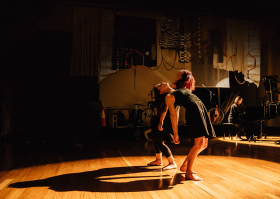Image: supplied
Annie Lumsden sits as the sole female performer on a barren stage, surrounded by the male voices of her story. She sits quietly and awkwardly as her male co-workers, friends and psychologist talk at her in attempt to comfort, reach out and ‘do the right thing’. Yet none are able to do so effectively. They talk over her and around her experience in an attempt to avoid having difficult conversations about issues that have no clear resolution. It is this fundamental lack of empathy and exclusion of the victim’s experience that form the substance of Little Daughters’ narrative.
The audience is never told what actually happened to Lumsden’s character and even though that shouldn’t matter I found myself wanting to know. It was an uncomfortable realisation that part of me wanted that information in order to make some kind of objective judgement about the incident and apportion sympathy based on it. Indeed, this is how society still views victims of sexual violence, through the lens of either the worthy or unworthy victim. We still hear media outlets talk about sexual violence in terms that undermine the trauma of victims and are quick to point the finger of blame.
Lumsden makes her discomfort obvious in interactions with the male characters. Their attempts at understanding may be well-intentioned but none are effective and their responses provide an interesting insight into how poorly equipped most men are to deal with the issue. It takes all the male characters leaving the stage completely before Lumsden’s character is able to open up and even then her experience is still difficult to fully relate, underscoring how difficult it is for most people who have suffered sexual violence to speak out.
The play has a real personal feeling to it thanks to a brave script by Annie Ferguson in her first full length stage play. This deeply personal dimension presents the performers with an acute challenge and unfortunately there were moments when the onstage intensity did not match the gravity of the story. Zachary Ruane’s use of an ascetic stage achieves its aim of bringing Ferguson’s writing to the fore and also exposed the ambiguities of the narrative, such as Lumsden’s dialogue with her assailant, in which the context is never entirely clear. At times, such as during the brilliantly caricatured therapy sessions, the minimalist staging contributes to the writing and performance.
Sexual violence, especially the long term toll it takes on the victim is still a regrettably under-explored issue, primarily because it’s an immensely difficult story to tell. Little Daughters takes up the challenge and makes commendable contribution to a much needed discussion.
Rating: 3 out of 5 stars
La Mama Theatre
10 – 21 June





